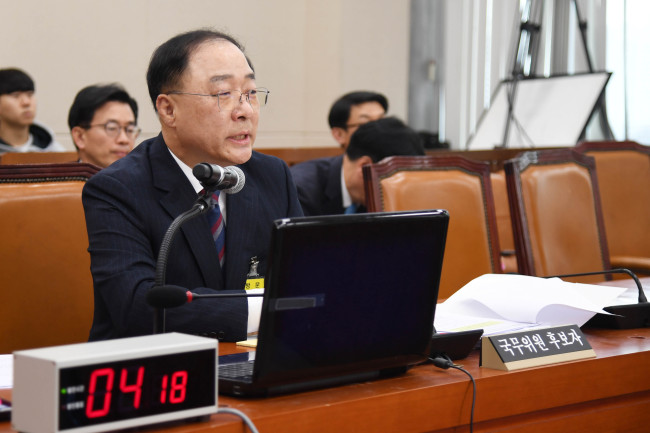Rival parties on Tuesday locked horns over the efficacy of the Moon Jae-in administration’s “income-led growth” paradigm at the parliamentary confirmation hearing of deputy prime minister and finance minister nominee Hong Nam-ki.
The hearing, however, was largely overshadowed by the ongoing brawl over the delayed passage of the 470.5 trillion won ($424 billion) state budget bill for next year.
“Though there have been disputes over the income-led growth initiative, I believe that the general direction of the policy is the right way to go,” the nominee said at his hearing at the National Assembly.
“As for some of the policies which did not meet the market’s expectations, we will make the necessary adjustments.”
 |
Deputy prime minister and finance minister nominee Hong Nam-ki speaks at his confirmation hearing at the National Assembly on Tuesday. (Ministry of Economy and Finance) |
Hong was named in November to replace Kim Dong-yeon as deputy prime minister and finance minister. He had been chief of the Office for Government Policy Coordination since May 2017.
While admitting that drastic policy changes had had some adverse effects, Hong called for patience and consistency in policy implementation.
“I take it seriously that our economy has struggled over the past year and a half,” he said.
Some policies, such as the hike in the minimum wage and the 52-hour restriction on weekly working hours, proceeded at a faster-than-expected pace and consequently had an impact on the real economy, Hong said.
In line with the progressive Moon government’s objectives to reduce income inequality, South Korea raised its legal minimum hourly wage to 7,530 won in January, up 16.4 percent from 6,470 won. The amount is again set to climb 10.9 percent to 8,350 won next year, as policymakers target 10,000 won or more per hour by year 2020.
Along with the adoption of the 52-hour maximum working week in July, the steep wage hike was seen as a factor in discouraging employers from hiring amid a slow-growing economy.
“I nevertheless expect that the income-led growth initiative will have a visible impact on (economic) indexes, starting in the second half of next year,” he said.
While the conservative main opposition Liberty Korea Party tackled the income-led growth initiative, the progressive minority Justice Party suggested that Moon’s economic policy team might be regressing to the conventional growth-focused paradigm.
“Income-led growth is to blame for most of the incumbent economic troubles, such as the employment crisis, uneven income distribution and investment downturn,” Rep. Park Myung-jae of the main opposition party said.
Rep. Sim Sang-jeung of the Justice Party, on the other hand, said the pledge to “adjust” the current policies indicates a willingness to compromise on income-led growth and give in to the conventional corporate-focused growth paradigm.
Parties were also at odds over Hong’s qualifications, including his past exemption from military duties because of chronic hepatitis.
Despite these issues, however, the hearing fell short of making headlines at the legislature as opposition parties remained preoccupied with other matters.
At a floor meeting earlier in the day, the Liberty Korea Party’s floor leader, Rep. Kim Sung-tae, expressed regrets over Parliamentary Speaker Moon Hee-sang’s decision to put the government’s budget bill to a vote the previous day, despite an opposition backlash.
The minority Bareunmirae Party, too, held a meeting but focused on the realignment of voting constituencies without mentioning Hong’s hearing.
The budget bill remained pending on Tuesday, two days past the legal deadline, with opposition parties vetoing the plenary session that would have been necessary to vote on the budget proposal.
By Bae Hyun-jung(
tellme@heraldcorp.com)








![[Today’s K-pop] Blackpink’s Jennie, Lisa invited to Coachella as solo acts](http://res.heraldm.com/phpwas/restmb_idxmake.php?idx=644&simg=/content/image/2024/11/21/20241121050099_0.jpg)